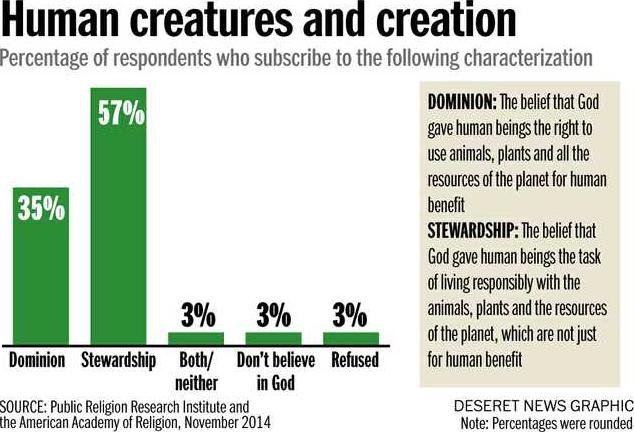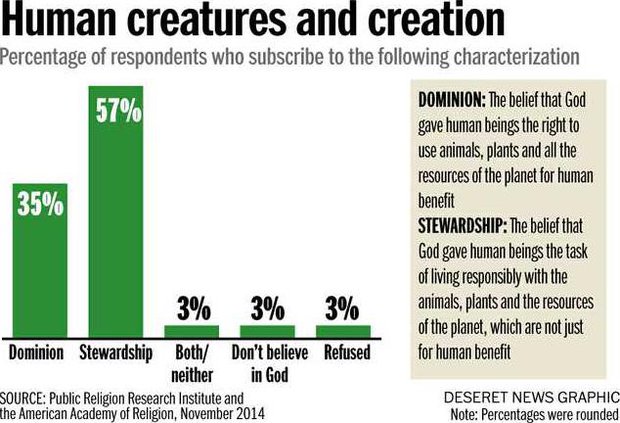In the beginning, religious leaders put little energy into biblical teachings about the environment. It was enough to know that God created an earth rich in resources and formed humans in his image to enjoy it.
However, the printing press that put English translations of the Bible in everyday people's hands brought with it an emphasis on interpretation, giving the words used to describe the relationship between human creatures and creation new significance.
The legacy of hundreds of years of discussions about the Bible's environmental lessons can be summarized in two words: dominion and stewardship. Both terms stem from interpretations of the Bible's telling of the creation, and reflect the influence of the Renaissance period's English monarchy, environmental crises of the 1960s and the climate change activists of today.
According to a November 2014 survey from Public Religion Research Institute, 57 percent of Americans espouse a stewardship mindset, believing that humans are called by God to live responsibly with plants, animals and earthly resources. Dominion thinking, which dominated global Christianity throughout the last four centuries and prioritizes human desires, is linked to just 35 percent of those surveyed.
Experts on the environmental movement said the choice between terms is crucial to whether Christians embrace the environmental movement. And yet the research showed it takes more than semantics to convince believers that their faith encompasses issues like climate change.
"We still have our individual desires and wants to wrestle with, and it's hard to change behavior," said the Rev. Mitch Hescox, president and CEO of the Evangelical Environmental Network.
Competing interpretations
Dominion, printed in many English translations of Gen. 1:28, comes from the Hebrew word "radah." It appears around two dozen times throughout the Bible, most often to describe the rule of Israelite kings and their relationship to their subjects, said the Rev. Hescox.
The translation originated during the Renaissance period, and the term is often associated with outspoken figures like Francis Bacon, who famously described nature as an enemy to be crushed and conquered.
"The word 'dominion' in the Bible, which was used in the King James Version, was associated with the monarchy," said Howard Snyder, a retired professor of history and theology of mission at Asbury Theological Seminary. Christians believed they could rule over the environment as kings during the Renaissance period ruled over their kingdoms, using resources for their benefit.
It wasn't until the late 20th century that "radah" was reinterpreted as stewardship, a shift inspired by high-profile environmental disasters like when oil pollution in Ohio's Cuyahoga River caught fire in 1969, as well as books such as Rachel Carson's "Silent Spring."
"People started asking, 'What are we doing to ourselves?'" and that fueled debates about how God calls Christians to act in their relationships with the planet, the Rev. Hescox said.
According to supporters of the stewardship concept, the term reflects how "radah" is used throughout the Old Testament, beyond its first mention in Gen. 1:28.
"God comes down really hard on the bad radah-ers," said Dave Warners, a professor of biology at Calvin College. "God's intention was that radah-ers would be sure their subjects thrived."
However, others noted that the stewardship concept also has flaws because it can be taken to mean that God has relinquished his duties and put humans in charge, a view that's definitely not found in the Bible, said Duke Divinity School Professor of Theology and Ecology Norman Wirzba.
He added that stewardship needs to be placed in a context that acknowledges humanity does have dominion in other words, dominate over the earth, affecting all of the planet's processes because of the sheer volume and activity of people alive today.
"Many critiques could be leveled against both (dominion and stewardship)," Wirzba said. "We have to surround them with other considerations to determine whether our behavior is for good or for bad."
How terms determine action
While the stewardship interpretation is now the majority mindset among white mainline Protestants, black Protestants and Catholics, it does not appear to influence Christian engagement with environmental initiatives.
For example, PRRI's survey found that although 66 percent of white mainline Protestants conceive of their relationship to creation as stewardship, only 43 percent of the group feel "very" or "somewhat" concerned about climate change.
The Rev. Hescox described it as a political problem that originated in the years following the American environmental movement's rise to prominence in the 1960s.
The global oil crisis in the 1970s politicized environmental efforts. Conservatives shifted away from expensive environmental initiatives in favor of reinvesting in the energy industry, Snyder said.
When meeting with religious leaders and their congregations, the Rev. Hescox tries to rebrand environmentalism as an issue of compassion, getting listeners to think about the issue in terms of the rising rates of health disorders rather than politics.
His organization speaks about environmental work in terms of "creation care," emphasizing supporters' belief that it's God's will for humans to live in harmony with plants, animals and all of the earth's resources in order to guarantee that future generations can thrive.
"Creation care is about our children and grandchildren's health," he said. "That's really the story."
Warners also spends a lot of time thinking about how to write and speak about the environment in more appealing ways. In December, he published an article (paywall) with two of his Calvin colleagues about reconceiving of the relationship between Christians and creation yet again.
"Before, it's been dominion over and stewardship of," he said. "What I'm trying to promote is reconciliation with."
Warners hopes to gather environmental leaders to the Calvin College campus for a 2017 conference tentatively titled, "Beyond Stewardship." However, even as he proposes the term's successor, Warners realizes that stewardship has not yet taken hold in many congregations.
"I do a lot of presentations in churches, and not everybody is really on board with stewardship," he said. "But regardless of verbiage, it's really important to see ourselves as less set apart from the rest of creation and more a part of it."
However, the printing press that put English translations of the Bible in everyday people's hands brought with it an emphasis on interpretation, giving the words used to describe the relationship between human creatures and creation new significance.
The legacy of hundreds of years of discussions about the Bible's environmental lessons can be summarized in two words: dominion and stewardship. Both terms stem from interpretations of the Bible's telling of the creation, and reflect the influence of the Renaissance period's English monarchy, environmental crises of the 1960s and the climate change activists of today.
According to a November 2014 survey from Public Religion Research Institute, 57 percent of Americans espouse a stewardship mindset, believing that humans are called by God to live responsibly with plants, animals and earthly resources. Dominion thinking, which dominated global Christianity throughout the last four centuries and prioritizes human desires, is linked to just 35 percent of those surveyed.
Experts on the environmental movement said the choice between terms is crucial to whether Christians embrace the environmental movement. And yet the research showed it takes more than semantics to convince believers that their faith encompasses issues like climate change.
"We still have our individual desires and wants to wrestle with, and it's hard to change behavior," said the Rev. Mitch Hescox, president and CEO of the Evangelical Environmental Network.
Competing interpretations
Dominion, printed in many English translations of Gen. 1:28, comes from the Hebrew word "radah." It appears around two dozen times throughout the Bible, most often to describe the rule of Israelite kings and their relationship to their subjects, said the Rev. Hescox.
The translation originated during the Renaissance period, and the term is often associated with outspoken figures like Francis Bacon, who famously described nature as an enemy to be crushed and conquered.
"The word 'dominion' in the Bible, which was used in the King James Version, was associated with the monarchy," said Howard Snyder, a retired professor of history and theology of mission at Asbury Theological Seminary. Christians believed they could rule over the environment as kings during the Renaissance period ruled over their kingdoms, using resources for their benefit.
It wasn't until the late 20th century that "radah" was reinterpreted as stewardship, a shift inspired by high-profile environmental disasters like when oil pollution in Ohio's Cuyahoga River caught fire in 1969, as well as books such as Rachel Carson's "Silent Spring."
"People started asking, 'What are we doing to ourselves?'" and that fueled debates about how God calls Christians to act in their relationships with the planet, the Rev. Hescox said.
According to supporters of the stewardship concept, the term reflects how "radah" is used throughout the Old Testament, beyond its first mention in Gen. 1:28.
"God comes down really hard on the bad radah-ers," said Dave Warners, a professor of biology at Calvin College. "God's intention was that radah-ers would be sure their subjects thrived."
However, others noted that the stewardship concept also has flaws because it can be taken to mean that God has relinquished his duties and put humans in charge, a view that's definitely not found in the Bible, said Duke Divinity School Professor of Theology and Ecology Norman Wirzba.
He added that stewardship needs to be placed in a context that acknowledges humanity does have dominion in other words, dominate over the earth, affecting all of the planet's processes because of the sheer volume and activity of people alive today.
"Many critiques could be leveled against both (dominion and stewardship)," Wirzba said. "We have to surround them with other considerations to determine whether our behavior is for good or for bad."
How terms determine action
While the stewardship interpretation is now the majority mindset among white mainline Protestants, black Protestants and Catholics, it does not appear to influence Christian engagement with environmental initiatives.
For example, PRRI's survey found that although 66 percent of white mainline Protestants conceive of their relationship to creation as stewardship, only 43 percent of the group feel "very" or "somewhat" concerned about climate change.
The Rev. Hescox described it as a political problem that originated in the years following the American environmental movement's rise to prominence in the 1960s.
The global oil crisis in the 1970s politicized environmental efforts. Conservatives shifted away from expensive environmental initiatives in favor of reinvesting in the energy industry, Snyder said.
When meeting with religious leaders and their congregations, the Rev. Hescox tries to rebrand environmentalism as an issue of compassion, getting listeners to think about the issue in terms of the rising rates of health disorders rather than politics.
His organization speaks about environmental work in terms of "creation care," emphasizing supporters' belief that it's God's will for humans to live in harmony with plants, animals and all of the earth's resources in order to guarantee that future generations can thrive.
"Creation care is about our children and grandchildren's health," he said. "That's really the story."
Warners also spends a lot of time thinking about how to write and speak about the environment in more appealing ways. In December, he published an article (paywall) with two of his Calvin colleagues about reconceiving of the relationship between Christians and creation yet again.
"Before, it's been dominion over and stewardship of," he said. "What I'm trying to promote is reconciliation with."
Warners hopes to gather environmental leaders to the Calvin College campus for a 2017 conference tentatively titled, "Beyond Stewardship." However, even as he proposes the term's successor, Warners realizes that stewardship has not yet taken hold in many congregations.
"I do a lot of presentations in churches, and not everybody is really on board with stewardship," he said. "But regardless of verbiage, it's really important to see ourselves as less set apart from the rest of creation and more a part of it."

